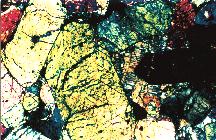Chassigny (meteorite)
| Chassigny meteorite | |
|---|---|

Thin section of Chassigny under cross-polarized light (JPL)
|
|
| Type | Achondrite |
| Class | Martian meteorite |
| Group | Chassignite |
| Parent body | Mars |
| Country | France |
| Region | Chassigny, Haute-Marne |
| Fall date | 1815-10-03 |
Chassigny is a Mars meteorite which fell on October 3, 1815, at approximately 8:00 am, in Chassigny, Haute-Marne, France. Chassigny is the meteorite for which the chassignites are named, and gives rise to the "C" in SNCs. Chassigny is an olivine cumulate rock (dunite). It consists almost entirely of olivine with intercumulous pyroxene, feldspar, and oxides. Chassigny was the only known chassignite until NWA2737 was found in the Moroccan Sahara in northwest Africa.
Chassigny is particularly important because, unlike most SNCs, it contains noble gas compositions different from the current Martian atmosphere. These differences are presumably due to its cumulate (mantle-derived) nature.
...
Wikipedia
